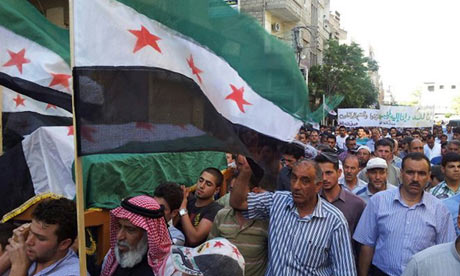More than 2,750 people killed this month in Syria as July set to be deadliest month since uprising began
Staff and agencies
guardian.co.uk,

The funeral near Damascus of a man who protesters say was killed by Assad forces. The Syrian Observatory for Human Rights claims 2,752 people were killed in the first 21 days of July. Photograph: Handout/Reuters
An activist group claims that more than 2,750 people have been killed in Syriaso far this month, bringing the death toll since the conflict began to more than 19,000.
The Syrian Observatory for Human Rights said if the current rate of killing continued until the end of July, it would be the deadliest month since the Syrian uprising erupted in March 2011.
The Observatory's chief, Rami Abdul-Rahman, said on Sunday that 2,752 people, including 1,933 civilians, 738 government troops and 81 rebels, were killed in the first 21 days of July.
Abdul-Rahman said June had been the deadliest month with 2,924 deaths.
The average daily death toll in June was 94, while this month it has increased to an average of 131 a day.
Heavy fighting continued on Sunday as Free Syrian Army (FSA) fighters battled government troops near the main intelligence base in the northern city of Aleppo, while helicopter gunships bombarded the capital, Damascus, in an effort to drive out insurgents, witnesses said.
Fighting raged in other parts of Aleppo, Syria's second largest city, and demonstrators defaced a statue of the president, Bashar al-Assad's father, the late Hafez al-Assad, overnight in the central Shahba area, breaking off parts of the stone edifice, according to a video made by activists.
"Sounds of explosions from different areas are shaking the whole city. A heavy exchange of gunfire has been going on near the state security headquarters in al-Mouhafaza since the morning," a resident there told Reuters by telephone.
Opposition sources said fighters from rural areas around Aleppo had been converging on the city of 3 million people near the border with Turkey. The rebel Tawhid Battalion said in a video statement that a battle to "liberate Aleppo" had begun.
In Damascus, Assad's forces appeared to be retaking territory occupied by insurgents earlier in the week, driving them out of the Mezze district, according to residents and opposition activists.
Elite Fourth Division troops were besieging the northern neighbourhood of Barzeh and the sound of tank fire was heard in the district, they said. Helicopter gunships fired machine guns at the nearby district of Rukn al-Din and Qaboun.
Aleppo had previously, for the most part, escaped the country's 16-month conflict, which has recently become a fast-changing guerrilla war between opposition fighters and the Syrian army, which has heavy weapons.
The battle in Aleppo comes after a devastating week for Assad, with fighting in the heart of Damascus; a bomb attack that killed four members of his military-security command; and predictions that his regime was entering its final weeks or months.
Assad's forces continue to control key cities, at least during the day, but have lost much of the rural hinterland. The FSA has been able to capture a series of border posts with Turkey and Iraq, further puncturing the regime's authority, and controls large areas of the northern and eastern periphery.
The FSA had previously reached within nine miles of Aleppo. On Saturday, activist Mohammad Saeed said dozens of FSA rebels had penetrated deep inside the city. There were reports that they had set up checkpoints in some areas. Video showed thick black smoke billowing over buildings. Some residents had painted walls with the pre-Ba'athist flag, the symbol of the revolution.
In a further sign of rapid regime erosion, four more army brigadiers were said to have crossed into Turkey, bringing the number of senior military defectors there to about 100. Another brigadier, Adelnasser Ferzat, defected to FSA fighters in Aleppo, it was claimed. In a video address in fluent Russian, he urges Moscow to dump Assad and back "freedom" and the rebels' side.
Activists said as many as 7,000 Aleppo residents had fled to safety. Last week's surge in violence trapped millions of Syrians, with areas of Damascus deserted and tens of thousands of refugees flooding into neighbouring Lebanon. Some 30,000 Syrians crossed the border into Lebanon on Thursday and Friday.
Diplomatic efforts to solve the crisis have been largely overtaken by events, despite a vote in the UN security council late on Thursday to extend the UN's monitoring mission for 30 days.
The international community remains divided. Iran, Russia and China steadfastly support the Assad regime; Saudi Arabia and Qatar are overtly aiding the rebels; Britain, the US and the EU are calling for a "political transition" and Assad's immediate departure. Meanwhile, Israel, the region's most formidable military power, announced it would consider action to prevent Syria's chemical weapons and missiles arsenal from falling into the hands of Hezbollah, Assad's Shia Islamist allies in neighbouring Lebanon.
Israel's defence minister, Ehud Barak, said: "I have instructed the military to increase its intelligence preparations and prepare what is needed so that … [if necessary] … we will be able to consider carrying out an operation."
http://samotalis.blogspot.com/
No comments:
Post a Comment